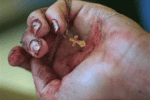The first Anglican church in Western Canada, St. John's Anglican Cathedral is poised to make history again with the appointment of a Lutheran pastor as priest of the cathedral and dean of the diocese.
Rev. Paul N. Johnson, an ordained minister in the Evangelical Lutheran Church in Canada, takes over as incumbent priest of the cathedral and dean of the diocese of Rupert's Land in January 2012, becoming the first Lutheran minister to hold those offices in Canada and perhaps the world.
"This is the first time, as far as we know, that a Lutheran will be serving an Anglican diocese as dean," says Johnson, 56, who spent seven years as assistant to the national Lutheran bishop and is now interim priest at All Saints Anglican Church.
"To me it's a very positive sign of movement in the right direction between the churches."
Johnson's posting comes a decade after the Evangelical Lutheran Church in Canada and the Anglican Church of Canada signed the Waterloo Declaration, which provides for full communion between the two denominations. Both groups recognize each other's baptisms, sacraments and ordinations, which means a Lutheran pastor can serve in an Anglican parish and an Anglican priest can be called to a Lutheran church.
"We are delighted to hear of this appointment, especially as it indicates another step in deepening our full communion," says ELCIC National Bishop Susan Johnson.
Nationally, a dozen Anglican priests work in Lutheran churches and nine Lutheran pastors are serving Anglican congregations.
In Manitoba, two Lutheran pastors in addition to Johnson are serving in Anglican parishes in the diocese of Rupert's Land, says Bishop Donald Phillips.
As dean, Johnson becomes senior clergy in the 65-parish diocese and would take over administrative duties if the bishop became incapacitated, says Phillips.
He says naming Johnson to the post demonstrates how trust and familiarity have developed between the two denominations over the past 10 years...
...The Waterloo Declaration outlines how the two groups can work together, but it also represents hope that Christian denominations will continue to find more common paths, says the head of the Anglican Church of Canada.
"It's been about working closer together, not so much for the sake of the (two) churches, but for the sake of the world. And a common witness is a stronger one," says Primate Fred Hiltz, who visits Winnipeg on Sunday for the installation of Maylanne Maybee as principal at the Centre of Christian Studies.
Finding a common witness is what motivates Johnson, a past vice-chair of the Canadian Council of Churches and a committed ecumenist. He says he comes to his new post not as a Lutheran pastor serving an Anglican congregation, but as a minister of the Christian church.
"I don't want them to all become Lutherans, I want us all to be Christians together," says Johnson, who was born in Papua New Guinea, where his parents were Lutheran missionaries.
"Theologically, spiritually, ontologically, God has made us one in Christ."
For the people of St. John's Cathedral, hiring a Lutheran pastor for an Anglican congregation is more than another footnote in the history books.
The people of the cathedral are confident that appointing Johnson as priest of the cathedral and dean of the diocese is noteworthy beyond the Anglican Church.
"This signifies to other churches to be looking beyond themselves," says Peter Moodie, the people's warden of St. John's.
"I think we need to look beyond ecumenical issues to interfaith issues. So I see this as moving in the right direction."
Same Old Arguments
-
We took a look at one atheist’s arguments for the non-existence of God
after we read BG’s post the other day. What is presented as arguments are
simply reh...
5 hours ago



.JPG)



































No comments:
Post a Comment